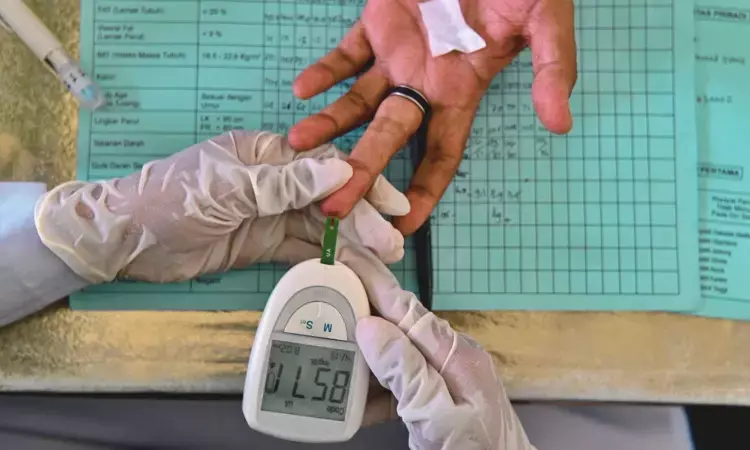- Home
- Medical news & Guidelines
- Anesthesiology
- Cardiology and CTVS
- Critical Care
- Dentistry
- Dermatology
- Diabetes and Endocrinology
- ENT
- Gastroenterology
- Medicine
- Nephrology
- Neurology
- Obstretics-Gynaecology
- Oncology
- Ophthalmology
- Orthopaedics
- Pediatrics-Neonatology
- Psychiatry
- Pulmonology
- Radiology
- Surgery
- Urology
- Laboratory Medicine
- Diet
- Nursing
- Paramedical
- Physiotherapy
- Health news
- Fact Check
- Bone Health Fact Check
- Brain Health Fact Check
- Cancer Related Fact Check
- Child Care Fact Check
- Dental and oral health fact check
- Diabetes and metabolic health fact check
- Diet and Nutrition Fact Check
- Eye and ENT Care Fact Check
- Fitness fact check
- Gut health fact check
- Heart health fact check
- Kidney health fact check
- Medical education fact check
- Men's health fact check
- Respiratory fact check
- Skin and hair care fact check
- Vaccine and Immunization fact check
- Women's health fact check
- AYUSH
- State News
- Andaman and Nicobar Islands
- Andhra Pradesh
- Arunachal Pradesh
- Assam
- Bihar
- Chandigarh
- Chattisgarh
- Dadra and Nagar Haveli
- Daman and Diu
- Delhi
- Goa
- Gujarat
- Haryana
- Himachal Pradesh
- Jammu & Kashmir
- Jharkhand
- Karnataka
- Kerala
- Ladakh
- Lakshadweep
- Madhya Pradesh
- Maharashtra
- Manipur
- Meghalaya
- Mizoram
- Nagaland
- Odisha
- Puducherry
- Punjab
- Rajasthan
- Sikkim
- Tamil Nadu
- Telangana
- Tripura
- Uttar Pradesh
- Uttrakhand
- West Bengal
- Medical Education
- Industry
GLP1-RAs use carries No Psychiatric Risk, rather Enhances Emotional Well-Being in Overweight Diabetes Patients: JAMA

A recent clinical trial published in the Journal of American Medical Association revealed that among individuals who are overweight, obese, and/or have diabetes, GLP1 receptor agonist (GLP1-RA) treatment does not increase the risk of psychiatric adverse events or depressive symptoms compared to placebo. Instead, it is linked to improved quality of life and healthier eating behaviors, including restrained and emotional eating. These results support the psychiatric safety of GLP1-RAs and highlight their positive impact on both physical and emotional health.
GLP-1 RAs like semaglutide and liraglutide are known for their benefits in managing diabetes and promoting weight loss. However, their impact on mental health has remained an open question, particularly given growing use in non-diabetic populations for weight management.
This meta-analysis reviewed data from trials sourced from MEDLINE, Embase, PsycINFO, and CENTRAL databases, aimed to clarify this issue. All included studies were double-blind, placebo-controlled trials in adults with overweight, obesity, or diabetes and assessed psychiatric, cognitive, or quality of life (QOL) outcomes.
The key findings showed no significant difference between GLP-1 RA treatment and placebo in terms of serious psychiatric adverse events (log risk ratio −0.02) or non-serious psychiatric issues (log risk ratio −0.03). Changes in depressive symptoms were also negligible (Hedges g = 0.02), indicating no worsening of mental health conditions.
But the analysis did uncover several psychological and lifestyle benefits. The patients receiving GLP-1 RA therapy showed small-to-moderate improvements in eating behavior, specifically in restrained eating (Hedges g = 0.35) and emotional eating (g = 0.32), suggesting enhanced control over impulsive eating patterns often associated with stress or negative moods.
Notably, GLP-1 RA users reported measurable enhancements across several quality-of-life domains; where mental health–related QOL improved (g = 0.15), indicating better emotional well-being. Physical health–related QOL (g = 0.20) and diabetes-specific QOL (g = 0.23) also increased, reflecting improved physical functioning and daily diabetes management.
Weight-related QOL (g = 0.27) showed the most robust improvement, suggesting greater satisfaction with weight and body image. This study provides strong evidence that GLP-1 RAs are not only physically effective but also safe from a psychiatric standpoint, with added benefits for emotional eating and quality of life.
Source:
Pierret, A. C. S., Mizuno, Y., Saunders, P., Lim, E., De Giorgi, R., Howes, O. D., McCutcheon, R. A., McGowan, B., Sen Gupta, P., Smith, D., Ismail, K., & Pillinger, T. (2025). Glucagon-like peptide 1 receptor agonists and mental health: A systematic review and meta-analysis. JAMA Psychiatry (Chicago, Ill.). https://doi.org/10.1001/jamapsychiatry.2025.0679
Neuroscience Masters graduate
Jacinthlyn Sylvia, a Neuroscience Master's graduate from Chennai has worked extensively in deciphering the neurobiology of cognition and motor control in aging. She also has spread-out exposure to Neurosurgery from her Bachelor’s. She is currently involved in active Neuro-Oncology research. She is an upcoming neuroscientist with a fiery passion for writing. Her news cover at Medical Dialogues feature recent discoveries and updates from the healthcare and biomedical research fields. She can be reached at editorial@medicaldialogues.in
Dr Kamal Kant Kohli-MBBS, DTCD- a chest specialist with more than 30 years of practice and a flair for writing clinical articles, Dr Kamal Kant Kohli joined Medical Dialogues as a Chief Editor of Medical News. Besides writing articles, as an editor, he proofreads and verifies all the medical content published on Medical Dialogues including those coming from journals, studies,medical conferences,guidelines etc. Email: drkohli@medicaldialogues.in. Contact no. 011-43720751


